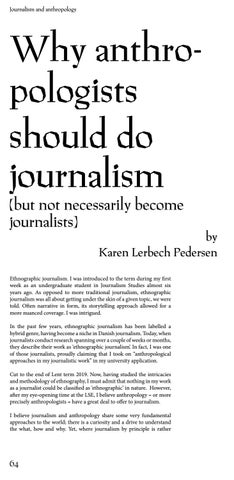Journalism and anthropology
Why anthropologists should do journalism (but not necessarily become journalists)
by Karen Lerbech Pedersen
Ethnographic journalism. I was introduced to the term during my first week as an undergraduate student in Journalism Studies almost six years ago. As opposed to more traditional journalism, ethnographic journalism was all about getting under the skin of a given topic, we were told. Often narrative in form, its storytelling approach allowed for a more nuanced coverage. I was intrigued. In the past few years, ethnographic journalism has been labelled a hybrid genre, having become a niche in Danish journalism. Today, when journalists conduct research spanning over a couple of weeks or months, they describe their work as ‘ethnographic journalism’. In fact, I was one of those journalists, proudly claiming that I took on “anthropological approaches in my journalistic work” in my university application. Cut to the end of Lent term 2019. Now, having studied the intricacies and methodology of ethnography, I must admit that nothing in my work as a journalist could be classified as ‘ethnographic’ in nature. However, after my eye-opening time at the LSE, I believe anthropology – or more precisely anthropologists – have a great deal to offer to journalism. I believe journalism and anthropology share some very fundamental approaches to the world; there is a curiosity and a drive to understand the what, how and why. Yet, where journalism by principle is rather
64
